Let’s face it—writing a novel can start with nothing more than a pen and a sheet of paper. But when you’re juggling characters, plot twists, timelines, and world-building, that simplicity can quickly spiral into chaos. Sticky notes scattered everywhere, half-formed ideas jotted down on random scraps of paper, or even a mishmash of notes across different mobile apps. Sound familiar?
I’ve been there. That’s why, over the years, I’ve tested countless tools to keep my writing organized. It’s part of my job, sure, but also something I genuinely love doing. In fact, my passion for writing and planning tools even inspired me to develop my own app tailored specifically for storytellers.
In this article, I’ll share my top five favorite tools for planning and writing a novel in 2025. These are the ones that have stood out after years of trial and error—tools designed to keep everything in one place, reduce distractions, and make the creative process smoother.
Scrivener
For years, Scrivener has been the gold standard for writers looking to organize their projects. As one of the first and most comprehensive tools for writing, it’s no surprise that it became a household name among novelists, screenwriters, and anyone tackling complex writing tasks. Scrivener offers a wide range of features that make it incredibly versatile. From its powerful organizational tools to the handy text-to-speech function, there’s little it can’t do. Plus, its one-time price is quite reasonable for such a robust app.
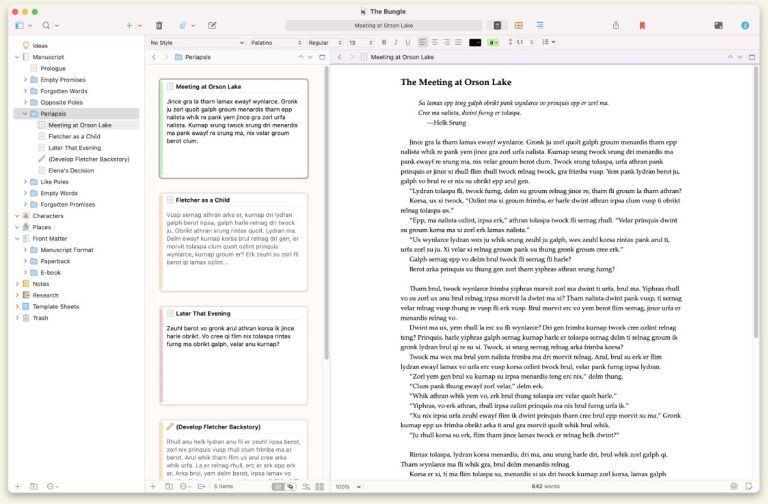
However, Scrivener isn’t without its flaws. One major drawback is its steep learning curve, which can be intimidating for new users. Additionally, while it was groundbreaking when it first launched, the app’s design and functionality now feel somewhat outdated. For me, the biggest issue lies in its mobile versions. The iPad and iPhone apps are significantly more limited than the desktop version, and the synchronization between devices has caused me several headaches—enough to make me stop using it altogether.
As someone who likes to keep all my notes in one place and accessible on the go, Scrivener’s limitations in this area are a dealbreaker. While it remains a solid choice for desktop writing, there are better options today for writers who need seamless mobility and modern features.
Pros:
- Versatile features.
- Designed specifically for writers.
- Excellent organizational tools.
- Handy text-to-speech function.
- Reasonable one-time purchase price.
Cons:
- Steep learning curve.
- Outdated design and functionality.
- Limited mobile app versions.
- Unreliable synchronization between devices.
Ulysses
When I first tried Ulysses, I loved its simply design and how smoothly it synced across my Apple devices. It felt modern and intuitive, and the way it organizes documents reminded me of Scrivener, but with a minimalist and polished touch. Features like word count goals, detailed statistics, and its excellent export options make it a fantastic tool for drafting.
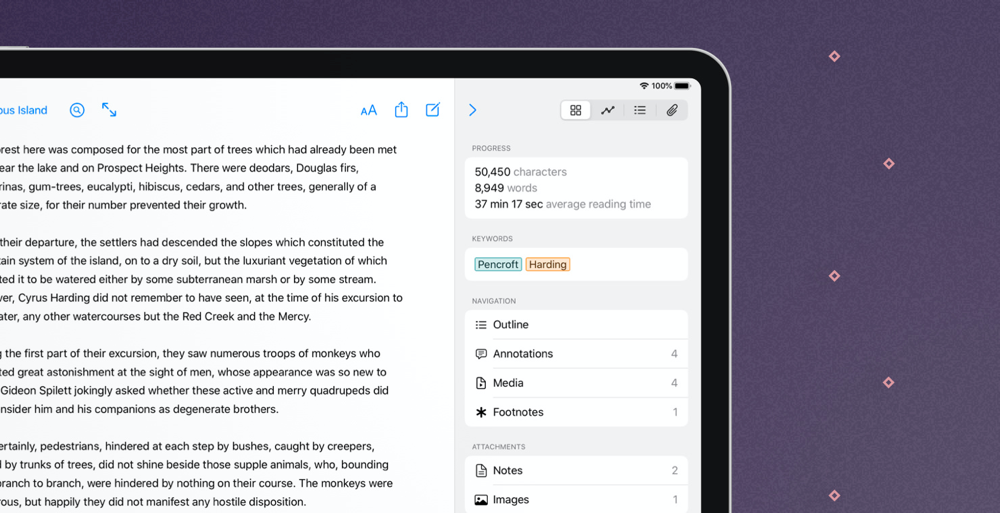
But despite all of this, I have mixed feelings about Ulysses. On the one hand, the app isn’t specifically designed for story planning, so organizing my projects while I’m still in outlining mode can get a bit chaotic if I’m not careful. On the other hand, it runs on a subscription model. It’s not outrageously expensive, but I tend to prefer tools that offer a one-time purchase option.
Pros
- Excellent synchronization across Apple devices.
- Clean, modern organization system.
- Great writing features like word count goals and easy export options.
Cons
- Not designed specifically for fiction or novel planning.
- Subscription-based pricing.
- Complex projects can feel chaotic without dedicated planning tools.
Story Planner for Writers
To be honest, I’m a bit biased when it comes to this tool because I helped design it. But the truth is, even if I hadn’t been involved, I think it would still be one of my favorite tools for organizing fiction projects. The biggest issue I’ve always faced when trying to develop my projects in apps is feeling constrained by them—lacking the freedom I get with pen and paper. With Story Planner, however, I feel much freer. It’s as if the app adapts to my way of thinking and my workflow, helping me build my stories without the usual headaches. I not only enjoy writing, but I also genuinely enjoy using this app.
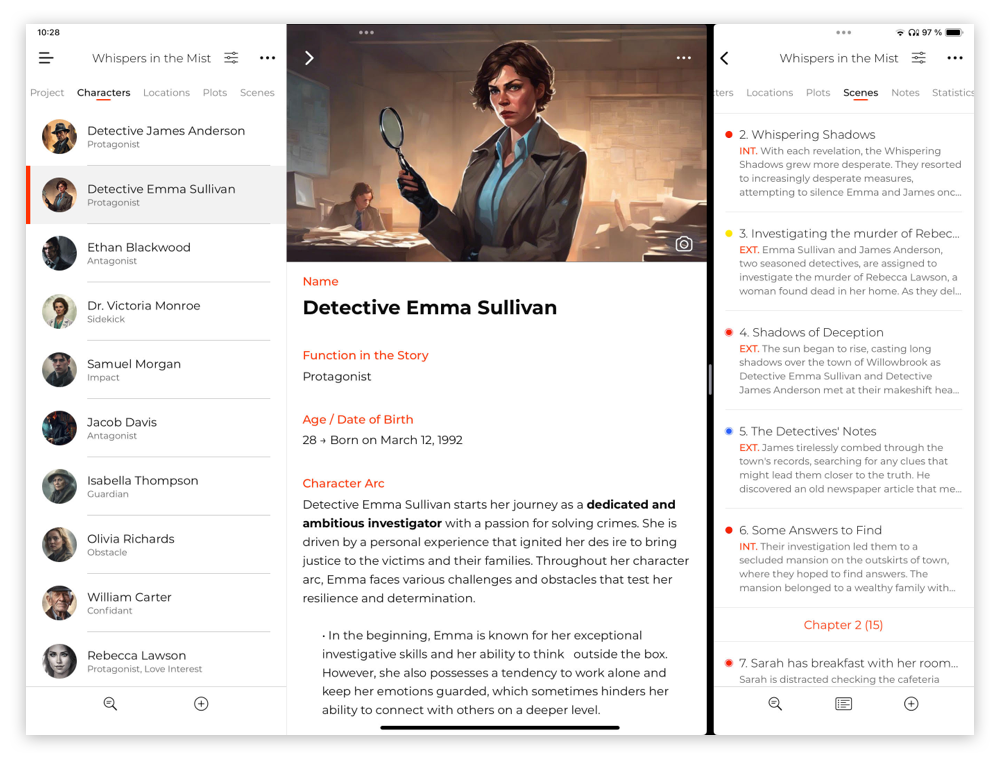
Why? Probably because Story Planner lets me see both the big picture of my story and all the intricate details at the same time. It allows me to create compartments for each aspect of my project (characters, locations, plots, notes, and ideas) while also linking them to specific scenes. This way, I can organize everything in one place and easily switch between tabs when I need to review something or focus on a particular part of the story. I also love being able to show or hide fields in the templates as I see fit—keeping things uncluttered during certain phases of the writing process and bringing them back when I need them. That’s the beauty of a tool designed specifically for this purpose and so customizable.
That said, I know it’s not perfect yet. Writing the final manuscript directly in the app is possible, but not as smooth as I’d like, and the project structure can feel a bit rigid at times. I would like (and I know many other users would too) to have many more customization options. The good news? These are exactly the areas we’re working to improve at this time.
Pros
- Designed specifically for fiction projects.
- Tools for organizing characters, plots, scenes, and more.
- It allows you to see the big picture of your story.
- Excellent synchronization across Apple devices.
- One-time purchase (no subscriptions, although it has a different price for Mac).
Cons
- Manuscript writing could be smoother (but it will be).
- Project structure is somewhat rigid (customization is on the way).
- Only available for Apple devices.
Google Docs
I didn’t always enjoy using Google Docs for writing manuscripts, but when they added document tabs, everything changed. This feature lets you break your work into sections, making it so much easier to keep track of things without getting lost. Although Google Docs might not be the first tool you think of for planning a novel, it’s definitely worth a look—especially if you’re on a budget. It’s free and works on pretty much any device, whether you use it in a browser or through its app. It’s fast, super easy to use, and so accessible that it’s a great choice if you’re after something simple.
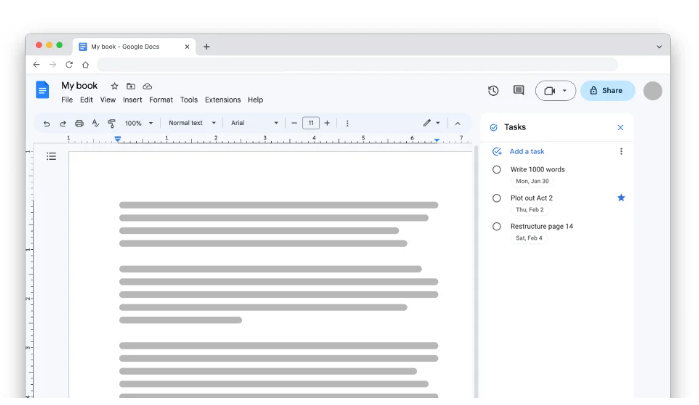
Version control and syncing work fine too, so you can relax knowing your work is safe and easy to recover if something ever goes wrong. That said, it’s not specifically made for planning novels, so if your project is on the complicated side, you might end up juggling a ton of separate documents and notes (though you can link them together pretty easily). Besides, Google Docs doesn’t handle huge projects very well. If you’re working on a massive manuscript, it can get a bit sluggish or take longer to load, which can be a bit annoying.
In any case, if you want to give it a try, you might want to check out Julia Lee Harter’s tips for writing her novel in Google Docs.
Pros
- Free and accessible on any device.
- Fast, easy to use, and beginner-friendly.
- Document tabs for better organization.
- Great version control and secure synchronization.
Cons
- Not designed specifically for novel planning.
- Can become unwieldy with complex projects.
- Performance issues with very large documents.
Obsidian
The last app on the list is a bit different from what usually comes to mind when we talk about writing software, but it might just be the most interesting one if you’re looking for something more visual or need a wiki-like organization for your novel’s universe. I’ve read it works brilliantly for writers tackling complex fantasy or sci-fi projects, especially multi-book sagas with countless characters, magical items, and locations.
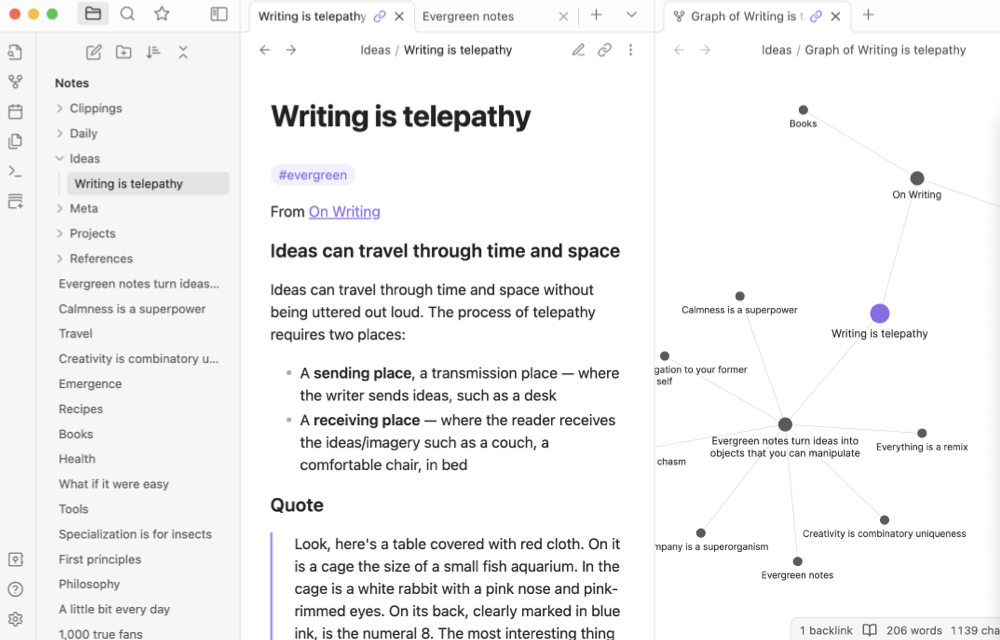
Obsidian is available on all major operating systems, offers a very robust free version, and lets you create vaults to organize folders, documents, calendars, and mind maps. I’m not a very visual planner myself (not the biggest fan of mind maps), but I love how easily you can link items in this app to create a network of interconnected notes. This can be helpful for tracking complex plots or building intricate worlds. (I really hope we can incorporate a feature like this into Story Planner in the future!).
That said, it’s worth noting that Obsidian isn’t specifically designed for planning or writing fiction. This means you’ll need to set up your own templates from scratch for every project, which can be time-consuming, especially if you’re new to the app. And yes, Obsidian also comes with a bit of a learning curve, and for me, it’s not particularly intuitive. I also don’t find it very visually appealing—it often feels more like working in a coding or command-writing app than in a text processor. While that might just be personal preference, for me, it’s a downside.
Pros
- Available across all major operating systems.
- Robust free version with lots of features.
- Great for creating mind maps, linking notes, and worldbuilding.
- Highly customizable and Markdown-friendly.
Cons
- Requires you to create project templates from scratch.
- Steep learning curve.
- Doesn’t feel like a writing-specific app.
- Less comfortable for manuscript drafting.
Final Thoughts
In conclusion, these are my five favorite novel planning tools for 2025, though there are certainly many more out there. The possibilities today are endless, and ultimately, each writer needs to find the tool that fits best with their workflow.
However, if you’re interested in trying out Story Planner, I’d love to hear your thoughts on it! It was a game-changer for me, and I hope it will be for you too. Or perhaps you can help make it even better by telling us what features you’d like to see. As indie developers, we are fully committed to the app and enjoy listening to our users to learn and keep improving. We believe in Story Planner, and while it’s already a great tool, it’s only going to get better!
